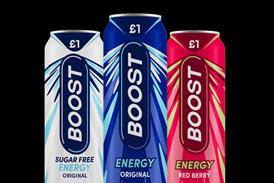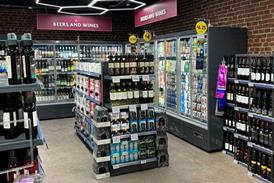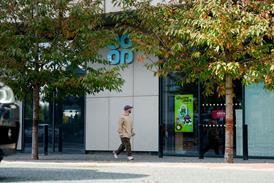Soft on crime, soft on the causes of crime - well retail crime at any rate. This is the overwhelming retailer perspective on the government following publication of the British Retail Consortium's 13th annual Retail Crime Survey.
The shocking findings that the number of shoplifting incidents has risen by 70% since 2000, despite the industry spending more than £4.3bn on prevention, has led many retailers to the conclusion that there is a failing in the prosecution and sentencing of offenders.
After all, most persistent shoplifters are well known to retailers. The evidence being gathered as a result of their investment in CCTV and other security systems provides the police with evidence to achieve convictions. So what is going wrong, and why is retail crime still such a major problem, especially for the small and medium sized retailer? Are we now, as a number of recent headlines have screamed, "a nation of shoplifters"?
Jonathan James, a Budgens retailer from Soham in Cambridgeshire, rejects this wholeheartedly. "In no way are we a nation of shoplifters," he argues. "Most offences are carried out by a handful of people who are known to us and the authorities."
He says that there simply is no deterrent to people who, for whatever reason, feel compelled to steal from stores. Jonathan cites a recent example in which he believed one person to be responsible for 21 instances of theft from his stores. He provided strong evidence to the police who spent hours of overtime on the case. The man was remanded in custody and prosecuted, but then received a conditional discharge.
"It's little wonder that criminals see shoplifting as a soft option," he explains. "But this doesn't take into account the impact it has on small store owners. If your company is making more than £1bn in six months, it's just a cost, but for many independents it could seriously affect their livelihood."
The impact on smaller shops is recognised by the BRC. In its report it claims that crime has a proportionately bigger impact on small and medium-sized enterprises (SMEs) than larger ones. This, it says, is in part down to the lack of resources they have to allocate to security systems and security staff.
In the past year 15% of SMEs have been forced to close for a time as a result of crime. For the same period 13% of SMEs have reported an increase in violent robbery. Meanwhile, 20% believe they will lose staff as a result of crime, violence or anti-social behaviour.
The much-publicised overflowing prison population has led to heated debate as to the best solution. The BRC is keen that the deterrent for potential shoplifters should not be weakened further. BRC director general Kevin Hawkins warns: "The government's failure to plan prison capacity is no excuse for giving a licence to steal. Anyone who believes only violent crime matters is seriously misguided."
He says that sentencing of these offenders is already too lenient. "Soft penalties and poor enforcement are to blame. Retailers spend millions on crime prevention as well as contributing £4.5bn in business rates. They are entitled to the support of government and police but are not getting it."
Nigel Dowdney, owner of two stores in Norfolk, agrees: "A reduction in sentences or any attempt to make shoplifting a crime that won't end in a prison sentence for all but a handful of criminals is not what we retailers need to see.
"The attitude the authorities seem to have is that shoplifting is a victimless crime. This is absolute rubbish. We are all victims of shoplifting, not only shopkeepers but also the general public as everyone will end up paying more for their goods."
Nigel has had his own troubles with the authorities' treatment of criminals who have targeted his stores. He banned one persistent offender from his store only to find out that the person was banned by the courts from entering all the shops in the area except Nigel's, as this was the closest shop to his house.
"The fact that I am the nearest shop means that I am also one of the retailers who has suffered the most from his shoplifting and other offences. It makes no sense," maintains Nigel.
Jonathan James says that retailers need to believe that shoplifters will be suitably punished to provide an effective deterrent. "It can be a custodial sentence, a suspended sentence or time spent painting old people's homes; there just has to be some form of effective punishment."
He argues that public perception of shoplifting is wrong. "If someone steals £100-worth of goods from your home, then that is burglary and dealt with accordingly. If someone comes into a shop and steals £100-worth of stock, it's shoplifting and not taken as seriously," he explains.
The Association of Convenience Stores (ACS) has joined the BRC's call for tougher sentencing, pointing out that as the number of shoplifting incidents increases so, too, does the threat of violence against staff. Some 60% of violent incidents that happen in stores occur when staff attempt to detain criminals or protect property.
James Lowman, ACS director of public affairs, points out: "There have to be effective measures to deter and prosecute criminals. They can only work if retailers report crimes. Police act on those reports and, once apprehended, offenders are effectively prosecuted. It is essential strong action is taken against these criminals."
Lowman says that the latest figures are a further indicator that the recent proposals by the Sentencing Advisory Panel are wrong to suggest removing custodial for shop theft. He adds: "This sends out entirely the wrong message at a time when shop theft is increasing."
The Sentencing Advisory Panel proposals are currently out for consultation until November 21.
Retail Crime - the facts
? Total cost of crime in 2005 - £2.1bn
? Total losses from shoplifting in 2005 - £767m
? Total cost of crime since 2000 - £13.39bn
? Average cost of shoplifting per incident - £149
? 40% of convenience retailers have experienced an increase in crime in 2005
Keith Webb, former costcutter franchisee
I previously ran a licensed Costcutter store in Ellesmere Port, Cheshire - until the frustrations of police inaction and the threat of personal harm became too great.
During my time the store suffered two ram raids and had an ongoing battle with shoplifters. On a few occasions it resulted in physical violence. The experience is no different to many retailers, of course, but my disappointment was with the police.
As we were in a tight-knit community, most of the 'rogues' were well known and I presumed that the police would be supportive. We regularly caught shoplifters on CCTV and provided the police with the evidence. This resulted in no action. After a few months I was advised that they were too busy and under-resourced to do anything unless we could give them the names and addresses of the perpetrators! But we found that we could, in fact, provide this information.
The final straw was, when chasing up progress at the police station, I was given back my 17 videos, all featuring theft along with required names and addresses. I was told that they didn't have the time to investigate further.
In my time only one thief was prosecuted and, eventually, the potential for serious injury outweighed the benefits of running my own store.
The current debate takes me back to my first Spar conference in Portugal in 1997, when Manchester police chief John Stalker gave a salutary speech in which he said that when it came to 'low-level crime', the police would have to put it at the very bottom of the pile. How truthfully he spoke.
















No comments yet